ジイド『ソヴェト旅行記』あらすじと感想~フランス人ノーベル賞文学者が憧れのソ連の実態に気づいた瞬間
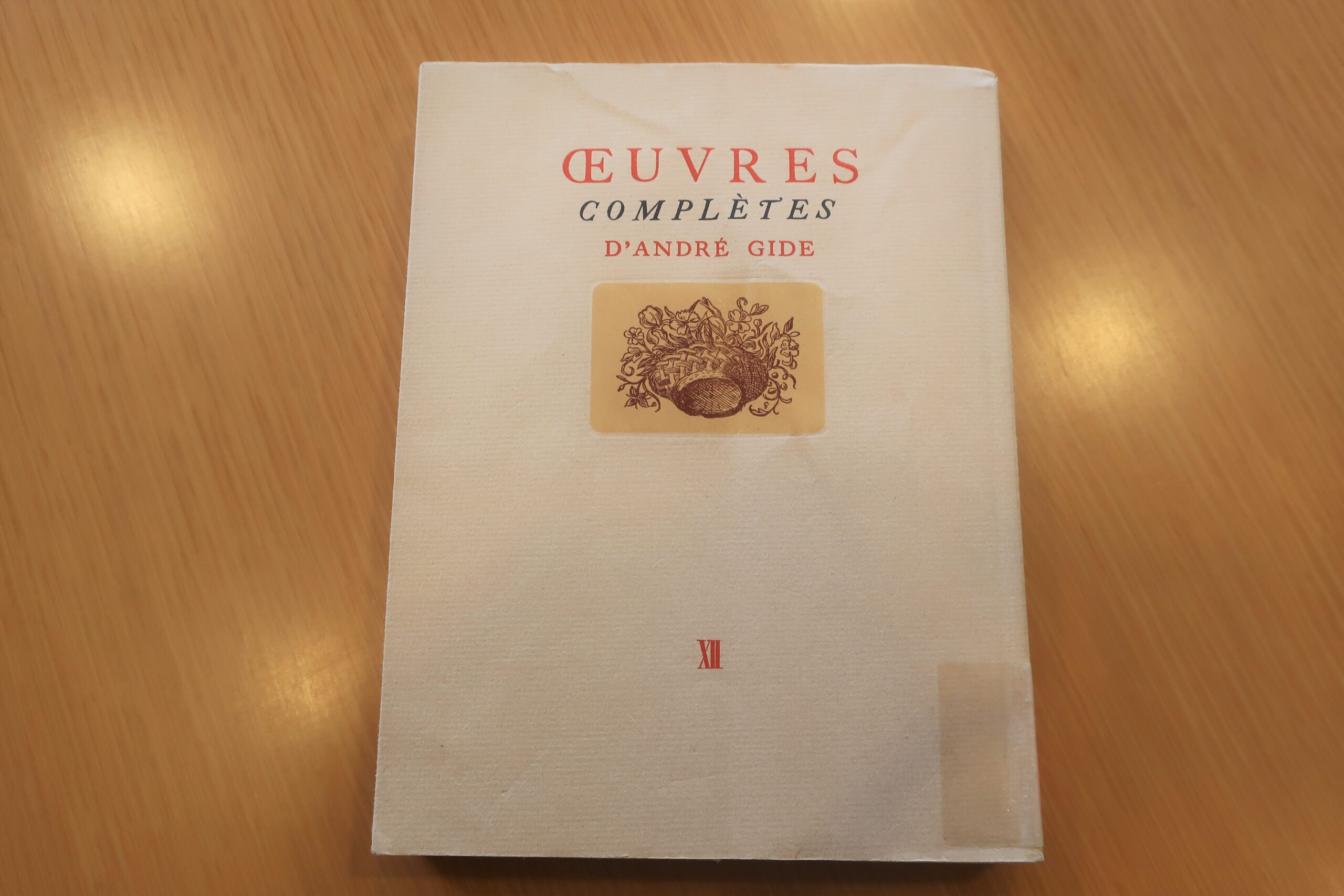
アンドレ・ジイド『ソヴェト旅行記』概要と感想~フランス人ノーベル賞文学者が憧れのソ連の実態に気づいた瞬間
今回ご紹介するのはアンドレ・ジイド著『ソヴェト旅行記』という本です。
私が読んだのは新潮社版、小松清訳の『ジイド全集第十二巻』所収の『ソヴェト旅行記』です。
私がこの本と出会うきっかけとなったのは「ロシア・ビヨンド」というサイトの以下の記事がきっかけでした。
ソ連とレーニン廟の関係は興味が尽きない https://t.co/sZjUVx5bmp
— 上田隆弘@函館錦識寺 (@kinsyokuzi) March 21, 2021
以前Twitterでもツイートしたのですがこの記事の中でジイドについて次のように紹介されていました。
アンドレ・ジイド(フランス)
ソ連のもう一人の「友人」で、フランスの有名作家であるアンドレ・ジイドは、1936年にモスクワを訪問した。彼は、マクシム・ゴーリキーの葬儀に参列し、レーニン廟で演説した。しかし、ソ連を旅したジイドは、この国の新体制とスターリンへのロマンティックなイメージを失い、フランスに戻ると、ノンフィクション『ソヴィエト紀行』の中で、否定的な実態を暴露した。結局、彼の作品はすべて、ソ連で発禁となった。
「ロシア・ビヨンド」レーニン廟上の外国の指導者や賓客たちより
ジイドはフランス人でしたがソ連に対し非常に強い関心を持ち、社会主義革命を進めるソ連に対し憧れを持っていました。そして1936年、ゴーリキーが危篤との知らせを受けソ連訪問が決まり、ソ連側からは熱烈な歓待を受けることになります。ゴーリキーについては以前紹介した以下の記事をご参照ください。
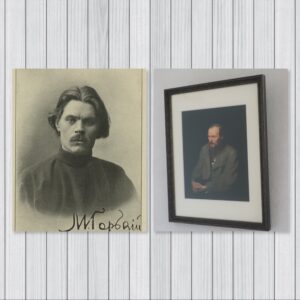
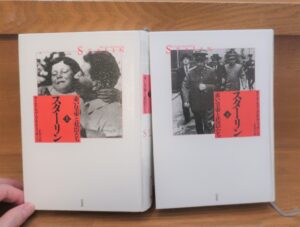
憧れのソ連を訪問し、どれほどこの国は素晴らしいのかと期待していたジイドでしたが、そこで彼は現実を知ってしまうことになります。その心情を綴ったのがこの『ソヴェト旅行記』という本になります。
せっかくですのでここでアンドレ・ジイドのプロフィールを見ていきます。
アンドレ・ジイドとは

アンドレ・ジッド
新潮社HPより
(1869-1951)1869年、パリ生まれ。早くに父を亡(な)くし、清教徒の厳しい母に育てられる。マラルメのもとで象徴主義の洗礼を受けたのち、『パリュード』(1896年)で小説の可能性を模索。つづく『背徳者』(1902年)では、生の称揚とともに少年愛の世界を繰り広げる。他の小説に『狭き門』(1909年)、『法王庁の抜け穴』(1913年)、『田園交響楽』(1919年)などがあり、代表作の『贋金(にせがね)づくり』(1926年)は「メタフィクション」の先駆となった。政治参加にも積極的で、植民地経営やスターリン主義をいちはやく批判。『コリドン』(1924年)で男色を擁護し、『一粒の麦もし死なずば』(1926年)では自身の同性愛をカムアウトした。1947年にノーベル文学賞を受賞し、1951年、八十一歳で死去。2002年、フランスのガリマール社より未発表作『ラミエ』が出版される。
ジイドはノーベル文学賞を受賞し、ドストエフスキーにも造詣が深い作家で、彼の『ドストエフスキー』という作品はドストエフスキー論の古典として有名です。
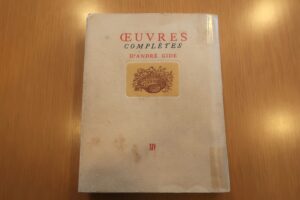
『ソヴェト旅行記』
では、『ソヴェト旅行記』巻末の解題よりこの作品の背景を改めて見ていきましょう。
一九三〇年代のはじめ頃から《ジイドの転向》という言葉がフランスのみならず他国でも盛んに用いられるようになった。共産主義への転向という意味である。事実、その頃のジイドの日記には、社会問題や共産主義に対する深い関心を示す個所が随所に見出される。当時のジイドにとっては、ソヴェトは、人類や文化の運命と結びつく大きな可能性であり、希望であったのである。
一九三六年六月中旬、マクシム・ゴルキイの病篤しの報に接するや急遽空路モスコー(※モスクワ、ブログ筆者注)に向かった。モスコーについたのが六月十七日。全ソ連作家同盟代表のコリツォフ、旧知のソ連作家ピリニヤーク、ちょうどソ連に来ていたルイ・アラゴンなどがこれを迎えた。
だが、翌十八日、彼が見舞ういとまもなくゴルキイは長逝した。
六月二十日、〈赤い広場〉で行われた告別式では、ジイドは、新しい世界を過去の世界に結合させる運命を荷なっていたゴルキイの棺を前にして、心からなる追悼の辞を述べた。
深い悲しみを心にひめたまま、ジイドはモスコーに二週間滞在し、色々な社会的、文化的施設を視察し、各界の代表的人物に会った。その後、レーニングラードをはじめ、各地を歩き、九月三日、空路パリに帰った。
新潮社版、小松清訳『ジイド全集第十二巻』所収『ソヴェト旅行記』P324
※一部改行し、旧字を新字に改めました
ジイドはフランス人でしたが、三〇年代から共産主義へ傾倒し、ソ連を理想の国家として考えるようになっていました。そのジイドがユートピア、ソ連へ赴くことになったのです。当時は簡単にソ連に入ることはできませんでしたし、情報も厳しく統制されていましたのでソ連に関する情報はかなり偏ったものでしかありませんでした。憧れの国へ行くことができるということでジイドはこの旅にかなり期待していたようです。
しかし実際に行ってみると、彼は現実と直面することになりました。
ジイドのこの旅行には二重の悲しみがあった。一つはウージェーヌ・ダビの死であった。ダビは一足遅れてソヴェトを訪れ、ジイドと行を共にしたのであるが、セバストポリで猩紅熱に冒され、遂に異国の土となったのである。
もう一つの悲しみは、ソヴェトへの大いなる幻滅である。同年十二月『ソヴェト旅行記』(別名『ソヴェトより帰る』)をN・R・F社から発行した。これはソヴェトに於ける順応主義、文化鎖国主義に痛烈なメスを入れたもので、賛否両論、フランスのみならず、世界各国に異常な反響を呼び起こした。〈プラウダ〉や〈文学新聞〉がこれに猛烈な反撃を加えたことは勿論である。
新潮社版、小松清訳『ジイド全集第十二巻』P324-325
※一部改行し、旧字を新字に改めました
彼が直面した悲しみは同行した友人の死と、何よりソ連への幻滅でした。
このソ連への旅とその時感じた思いを綴ったのが『ソヴェト旅行記』になります。ソ連を批判するこの本は賛否両論を巻き起こし、世界各国で異常な反響をもたらしたそうです。特に、ソ連からものすごい反撃が来たというのがリアルですよね。
私が読んだ『ジイド全集第十二巻』にはこうした反撃に対するジイドの反論が述べられた『ソヴェト旅行修正』という作品も収められています。
個人的にはこちらから先に読んでいった方がより『ソヴェト旅行記』がわかりやすくなると思います。
なぜジイドがソ連に幻滅するようになったのかということがより明快に書かれているのはこちらの方になります。
その一部をご紹介します。
「ソ連は私を欺いた」
私の信頼と讃嘆と欣びの失墜。それをあんなに深刻なもの痛ましいものにしたのは、諸君の空威張の行過ぎにあった。それと同じく、私がソヴェトを咎めるのも、決してより以上の結果をおさめていないからではない。
今になって、人はソヴェトがこれ以上のものを、もっと速かに収め得られなかった訳を私に説明してくれる。それを私が理解すべきであると言う。私が到底想像できないような低い段階から、ソヴェトが出発したということ、そして今日多くの労働者が生きている悲惨な状態も、かつて帝政時代の虐げられた人びとが空しく夢みたものだ、と言ってきかせてくれる。思うに、人々はかく言いながら、またいささか誇脹しているようだ。
否、私が特にソヴェトにたいして慊らなく思うのは、この国の労働者の生活を羨ましいもののように描いて、私たちを見事欺いたところにある。だから、私がフランスの共産党員を咎め立てするのも(私がここで問題にしているのは欺かれたコムニストでなくて、ソヴェトの現実を知っていた連中、或は知っていなければならなかった連中である。)自国の労働者を無意識的であれ意識的であれ(この場合は政策として)欺いたからである。
新潮社版、小松清訳『ジイド全集第十二巻』所収『ソヴェト旅行記修正』P115
※一部改行し、旧字を新字に改めました
ジイドがソ連を旅した際、彼は国賓扱いでソ連側から歓待されました。
最上級のホテルで最高級の食事やおもてなしを受け、彼が案内された場所では全てが完璧に整えられ、そこで出会う人々は皆夢や希望に溢れ、教養も素晴らしく、この国は驚くほど発達しているという印象を受けるようなものでありました。
しかし、ジイドはそうした完全護送スタイルの歓待からわざと距離を置き、一人で街を歩いたりしたそうです。そこで目にした光景や、人々との交流によって徐々にその実態を知ることになります。
『ソヴェト旅行記』『ソヴェト旅行修正』ではそうしたジイドの体験が綴られています。ここで紹介したいものが山ほどあるのですが、分量的にもそうはいきません。というわけで2つほどジイドのユーモアが効いた小話を紹介していきたいと思います。
小話①愛すべき案内人ー己の無知を知らぬことは、人間をたいへん肯定的にする
ここスゥフゥムは、ヴォロノフ教授の若返り法(註 ホルモン移植)や、その他の実験に使うために、非常に多くの猿を飼っている。これらの猿が、何処からきたのだろうと思って訊ねると、答は雑多であり、且つ矛盾だらけである。かつてアフリカの植民地(コンゴ)に行ったときと、少しも変わらない。多くの人たちは、漠然とした知識や無駄な言葉を並べることに満足しているようである。とりわけ、私たちの通訳と案内役をしてくれている愛すべき女性の同志はそうである。
とに角、この女史にかかると、何事にもすらすら解答がでてくるし、従って返事に窮するということがない。自分の知らぬことほど、答は確乎としている。ただ、自分では少しもそのことに気がついていない。だが、彼女は私にこんなことを教えてくれる。ー己れの無知を知らぬことは、人間をたいへん肯定的にするものだということを。これらの人々の精神は≪いい加減≫な知識と出鱈目な材料と模造品ででっちあげられている……。
「ここで飼っている猿は、どこからきたものか、判りますか?」
「判りますとも。わけありませんわ。」(と言いながら。私たちにつきそっている人に訊ねる。)
「ここの猿は殆んどみなここで生れたのです。ええ、殆んどみなここの生れですわ。」
「でも、ここには、もともと猿はいなかったと聞いているが、やはり初めは何処からか連れてきたのでしょう?」
「勿論そうですわ。」
「そうだとすると、何処から連れてきたのでしょう?」
すると今度は、連れの人にきかないで、さっそく落着き払って、
「方々から少しづつ連れてきたのですわ。」
私たちの愛すべき案内者は、申し分のないほど親切で、献身的である。憎むらく、いささか退屈なのは、彼女の教えてくれることが、誤っているという点で、はっきりしていることだ。
新潮社版、小松清訳『ジイド全集第十二巻』所収『ソヴェト旅行記修正』P171-172
※一部改行し、旧字を新字に改めました
この小話がジイドがユーモアを効かせた皮肉であることは見逃せません。ソ連では情報が統制され、自分で何かを考えることは反抗分子と見なされ収容所送りにつながります。ソ連の人々はもはや自分では考えることができない、でも「答え」は持っている。党から与えられる「正しい答え」が彼らを肯定的にするとジイドが皮肉るのです。
小話②質素な生活は仮の姿?
パリに帰ってから。
ソヴェトから帰ってきた善良なCは、すっかり有頂天になっている。Cが私に言う。
「あの国の偉大な指導者たちが、ひどく特権階級的だと仰言るが、どんな点をみてそう言われるのです?私はKとよくつき合っていたが、とても親切で、しかも質素な生活をしていましたよ。彼のアパートにも行きましたが、豪奢とか贅沢といったところはまるでなかったですよ。夫人にも紹介されましたが、これまた気持のいい質素なひとでしたよ……」
「夫人って、どの夫人?」
「どの夫人って、どういうことです?つまり彼の奥さんですよ。」
「あ、あの正妻のことかね。君は知らんのかい、三号まであるってことを?だからアパートだって、もう二つあるし、保養地にだって楽に出かけられるし、自動車だって三台ある。君が見たのは、いっとう粗末な、つまり本宅用のやつだよ……」
「そりゃ本当ですか?」
「本当だとも、正真正銘。」
「それでよく党がそんなことを黙って見ていますね。どうして、スターリンが?……」
「君もいい加減、お人好しだね。スターリンが恐れているのは、純粋な人物、私腹を肥やしてない痩せた人間たちだよ。」
新潮社版、小松清訳『ジイド全集第十二巻』所収『ソヴェト旅行記修正』P173
※一部改行し、旧字を新字に改めました
これもかなり皮肉が効いていますよね。党幹部の腐敗はレーニン時代からすでに始まっていましたがスターリン時代にはさらに進行していたようです。
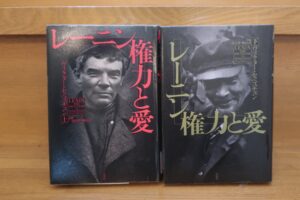
最後の言葉がまた痛烈です。「君もいい加減、お人好しだね。スターリンが恐れているのは、純粋な人物、私腹を肥やしてない痩せた人間たちだよ。」という言葉でソ連を強烈に批判しています。
ソヴィエトにおける順応主義ー幸福は、希望と信頼と無知によって作られる
『ソヴェト旅行記修正』に収められたジイドの小話2つを紹介しましたが、最後に『ソヴェト旅行記』からジイドのソ連評の重要な箇所を紹介したいと思います。
ソヴェトに於ては、何事たるを問わずすべてのことに、一定の意見しかもてないということは、前もって、しかも断乎として認められているのである。
だが、人々はみな、非常によく訓練された精神の持主となっているので、こうした順応主義も、彼らには容易な、自然な、一向に平気なものとすらなっている。そこに偽善があろうなどとは考えられないほどに。……
革命をやったのはこれらの人たちだろうか?いや、彼らは革命の恩恵をうけている人々でしかない。毎朝、プラウダ紙は、彼らが知り、考え、信じるに相応しいことを彼らに教えている。その教えの範囲から外にでることは危い!だから、一人のロシア人と話していても、まるでロシア人全体と話しているような気がする。
これは各人が一つの合言葉に文字どおり服従しているからではなく、一切が各人を類似させるように手入れされているからだ。しかも、このような精神の訓練は、ずっと幼ない子供の時代からはじめられるのである。
そこから、異国人たる君には、時として不思議に思われるあの異常な受諾と、それにもまして君を驚かせるあの幸福の可能性が生れてくるのである。
新潮社版、小松清訳『ジイド全集第十二巻』所収『ソヴェト旅行記』P32
※一部改行し、旧字を新字に改めました
「毎朝、プラウダ紙は、彼らが知り、考え、信じるに相応しいことを彼らに教えている。その教えの範囲から外にでることは危い!だから、一人のロシア人と話していても、まるでロシア人全体と話しているような気がする。」というジイドの実感はなんとも不気味ですよね。
そしてそのようなロシア人の精神は幼い頃からの訓練によって染みこまされたものであるとジイドは述べます。レーニン、スターリンと続いてきた共産党政権は長い時間をかけて国民の精神を教育していきました。その効果が1930年代後半頃には露骨に表れてきていたのでした。
これは他人ごとではありません。私達の生きる日本はどうでしょうか。当時のソ連とは絶対に違うと言い切れるでしょうか。教育の怖い所は、それが完全に染み込んでしまうともはやそれを疑問に思うことも違和感を感じることもなくなってしまうところにあります。もはやそれが完全に「当たり前」になってしまい、無意識なものとなってしまうのです。ジイドはそのことをここで指摘していると思われます。ジイドは続けます。
君は、幾時間も列をつくって並んでいる彼らを不憫に思う。しかし彼らにとっては、待つということは極めて自然なことなのだ。ここのパンや野菜や果物を君は不味く思うだろう。しかし、これよりほかのものはないのだ。人々が君に見せるこれらの布、これらの品物を、君は醜いと言う。が、選択の余地はないのだ。
少しも未練を感じさせないあの過去は別としても、他に比較するものをもたない彼らは、与えられたものに悦んで満足しなくてはならない。要は、人々に少くともよりよき生活を待っている間、彼らはみな可能な範囲において幸福であると信じこませることである。他所のいづこの国の人間も、彼らより幸福でないということを信じこませることである。
そして、こうしたことは、細心に外部とのあらゆる接触(すなわち国境の彼方との)を妨げることによってはじめて出来るのである。
そのお陰で、ロシアの労働者は、フランスの労働者と同じ位の、或は明らかに低い生活条件にありながら、なお自分を幸福と信じているし、また実際、フランスの労働者などよりは一層、いや比較にならぬほどずっと幸福である。謂わば、彼らの幸福は、希望と信頼と無知によってつくられているのである。
新潮社版、小松清訳『ジイド全集第十二巻』所収『ソヴェト旅行記』P32-33
※一部改行し、旧字を新字に改めました
ソ連人は外国とは断絶され、国外のことはほとんど知りませんでした。そのため比べるべき対象がなかったのです。
このことは2019年に私がキューバを訪れたときにもガイドさんから聞いた記憶があります。

ガイドさんはこう言っていました。
「キューバ人は他国のことを知りません。比べる相手のことを知らないのです。
山の中で孤立していた村のようなものです。
外部のことはまったく知りませんが、逆に言えば村のみんなのことは知っていますし、小さい時からずっと住み続けています。
これもキューバ人の気質を育んだひとつの要因かもしれませんね。」
これはジイドが言う状況とも似ているような気がします。
ただ、ソ連はキューバよりもかなり強制的に国民を教育していた点では違うかもしれません。
この引用の最後の「ロシアの労働者は、フランスの労働者と同じ位の、或は明らかに低い生活条件にありながら、なお自分を幸福と信じているし、また実際、フランスの労働者などよりは一層、いや比較にならぬほどずっと幸福である。謂わば、彼らの幸福は、希望と信頼と無知によってつくられているのである。」というのはあまりに示唆的であると思います。
ドストエフスキーに造詣の深いジイドらしいコメントであるようにも感じます。
これはまさしく『カラマーゾフの兄弟』の「大審問官の章」の問題そのものではないかと私は思ってしまいました。
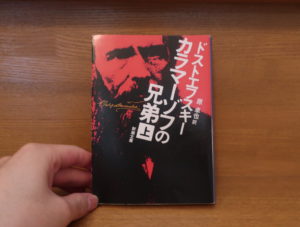
スターリンは人々に何が正しくて、何をすべきかを教えました。それに沿って行動すれば立派なソ連人、そこから逸脱すれば反抗分子、裏切り者となります。
善と悪の基準は個々の良心における問題ではなく、スターリンの与える答えに従順であるかどうかでしかなくなってしまったのです。しかし、従順でさえいれば、幸福が約束される(本当に幸福かどうかは別として)。
こうした社会をジイドはソ連への旅で見出してしまったのでした。だからこそ彼は憧れていたソ連に幻滅してしまったのです。
最後にソヴィエトに対するジイドの見解を引用してこの記事を終えたいと思います。
今日、ソヴェトで≪反対派≫と呼ばれているものは、自由なる批判と思想の自由の持ち主に他ならない。スターリンは同意しかうけつけない。彼に喝采をおくらないものを、すべて敵としてみる。彼は、しばしば、他人の提出した改革意見を、あとになって自分のものにすることがある。すっかり自分のものにするために、先づ提案した人間をなくしてしまう。これが彼の理屈を通す常套手段である。
だから、やがて彼の周囲には、彼にとって害を及ぼさない連中しかいなくなる。害を及ぼさない連中とは、まるっきり意見といったものを持たない人間たちである。己れの身辺に有能の士を置かず、おもねる者のみを置く。これが専制主義の真髄なのである。
新潮社版、小松清訳『ジイド全集第十二巻』所収『ソヴェト旅行記修正』P145
※一部改行し、旧字を新字に改めました
ジイドはソ連に対してこのように述べました。
しかしこれは当時のソ連だけの問題ではありません。私たちが生きる現代においてもこの言葉は生きています。世界中見回してもまさしくそうですよね。日本だって全く他人事ではありません。ソ連の歴史を学ぶことは「今の世界」を学ぶことでもあります。
ジイドの『ソヴェト旅行記』は非常に興味深い本でした。本当はもっともっと紹介したい箇所があったのですがそこはぜひ皆さん自身で手に取ってみてください。ものすごく面白い本ですのでとてもおすすめです。
以上、「ジイド『ソヴェト旅行記』フランス人ノーベル賞文学者が憧れのソ連の実態に気づいた瞬間」でした。
Amazon商品ページはこちら↓
アンドレ・ジイド全集〈第12巻〉ソヴェト旅行記 (1950年)
次の記事はこちら

前の記事はこちら
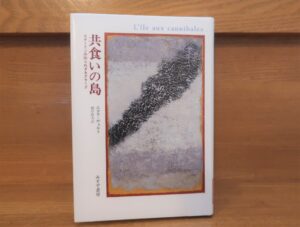
スターリン関連の記事一覧はこちらです。全部で14記事あります。

関連記事
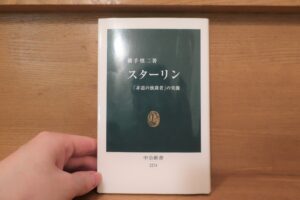


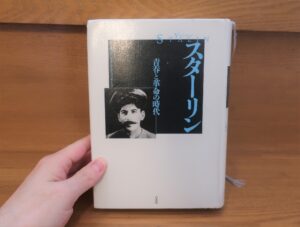


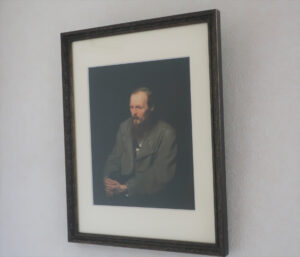


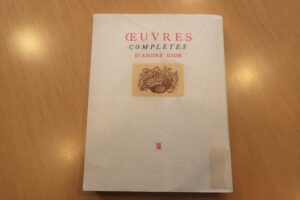
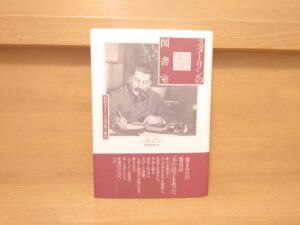
コメント